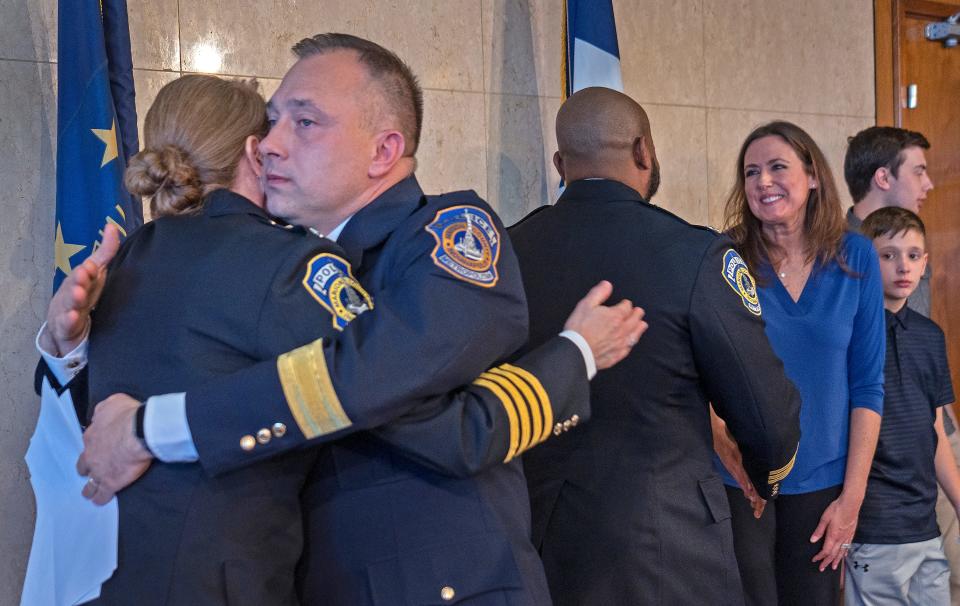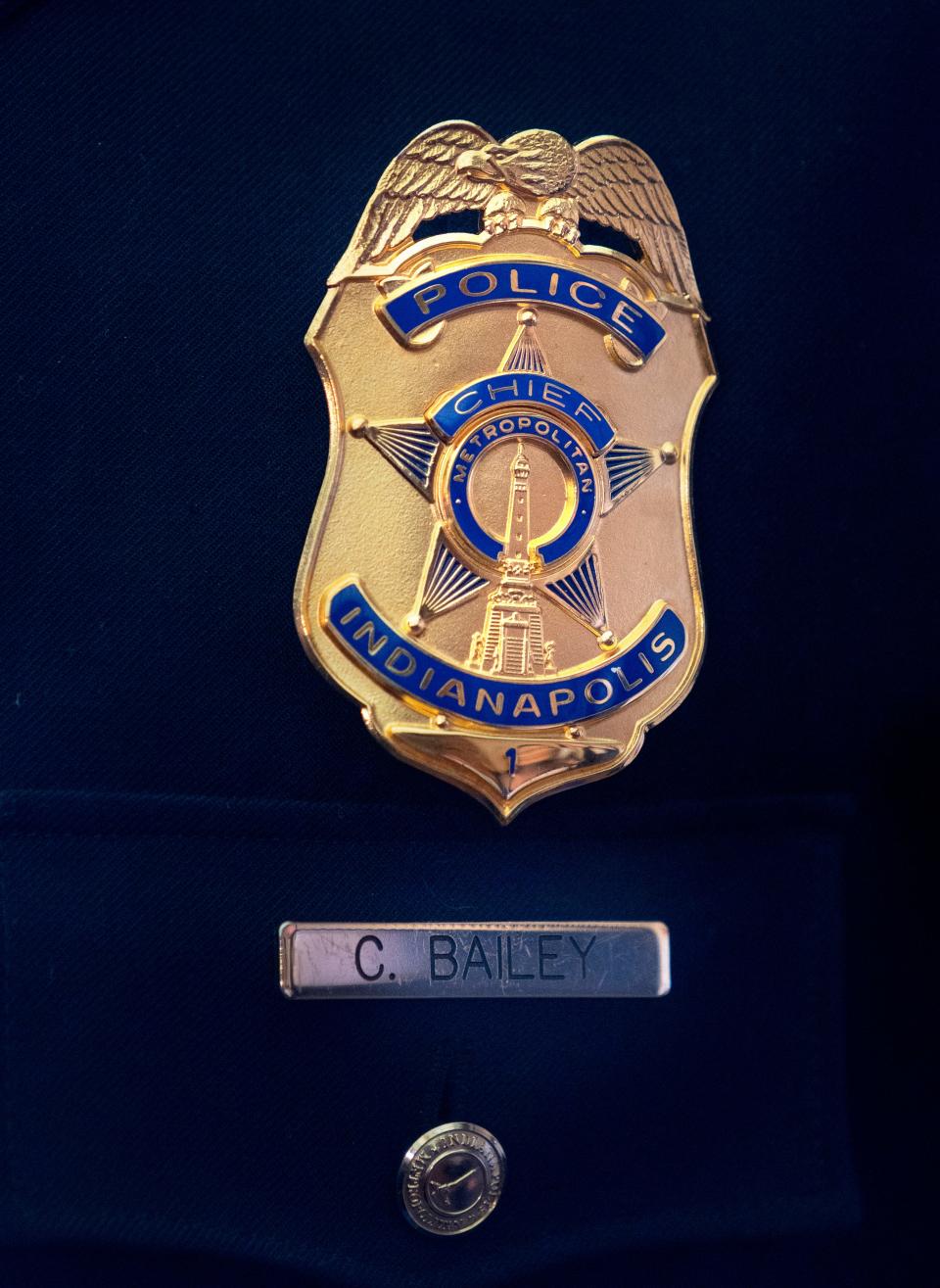IMPD's new Chief Christopher Bailey talks recruiting, technology and priorities in new Q&A
Christopher Bailey spent the morning of his first full day as the new chief of Indianapolis Metropolitan Police Department answering emails. They were mostly congratulatory messages from community members.
More: Indianapolis mayor names Christopher Bailey as police chief
He also made sure to get coffee before fielding questions about what was to come for the department.
In a brief interview Tuesday with Indystar, Bailey answered questions about his priorities to move the department forward, plans for recruitment, officer discipline and how technology can help fill gaps in staffing. The questions and the chief's responses have been edited for brevity and clarity.

Are there any priorities that you want to tackle first, within the first 100 days of your tenure?
Bailey: Making sure we are figuring out ways to retain the great talent and to figure out a way to recruit more officers into this agency. Everything we want to do going forward — community engagement, violence reduction — hinges on having the appropriate amount of officers to focus proactively on the issues that we need to get done. (I also) talked about technology and leveraging that to make the jobs of our officers easier internally, and then making our data more accessible to the community.
It seems there's been a ramp up and expansion of technology on the force, particularly with the gunshot detection system. Can you talk a little bit about that ramp up? And when will people learn where those systems have been set up around the city and when will the data be available?
Bailey: The gunshot detection program is still in development. There's some different opinion about the efficacy of that particular technology and whether it actually works and reduces crime. It's a very expensive piece of technology. In our city's 400 square miles, we're probably never going to have enough money to put it in all the places that we want. So, we sought out some new grants as a way to try to fund that and test it out in a small area. That process is still ongoing.
Our automated license plate readers, public safety cameras, partnership with businesses in our program called Business Link, or B-Link, have been very successful in helping us solve crimes. We're able to sit in a room and watch cameras at intersections downtown during large events or just on a Saturday night. It allows us to provide information to our officers so that they can respond and prevent crime from happening.
I only think technology is going to expand, especially if we're not going to be able to grow our workforce the way we want it to. We have to figure out ways to leverage technology to make our jobs easier. Also, I was tasked with looking at the operational tempo of our agency and what makes sense going forward, what jobs can be done by professional staff employees rather than sworn officers. I'm talking about finding ways to be more efficient and using professionally-trained people rather than professionally-trained cops who may not have a skill set in a particular area.
Were the results of the gunshots detection pilot program mixed?
It was mixed. When we do deploy it, it'll be a very small area, and it will be attached with a study to educate all of us on whether or not it's a worthy investment to expand. It's very expensive.

How do you ensure you can maintain the staffing levels in the department while also ensuring that officers who do need discipline or are recommended for being fired will get the discipline that they need? There have been incidents in past where the recommendation to fire an officer has been reversed.
Our staffing levels do not play a role in whether someone is recommended for termination or disciplinary action. It's behavior based and it's after due process, and after a careful review of the facts and circumstances surrounding it. Ultimately, that civilian merit board is the group of individuals that are responsible for any discipline over 10 days, up into including demotion and termination.
But if you do recommend someone to be fired and the board reverses it or doesn't agree, how would you handle that situation?
The law puts civilians in charge of whether someone is terminated from the police department. They have to evaluate the facts. They have to make a decision that they feel is appropriate. We, as an agency, have to live by that decision and provide the officers, if possible, remedial training, other things to ensure that our policies and procedures are followed.
I just wanted to circle back quickly to the gunshot detection system program. Are you personally, as the new chief, sold that this is a technology that can help officers in your department?
Frankly I'm not, but I also don't have all the information I need to see what works here. I've read the information online and see what works and what doesn't work in other cities. But, until I've seen what it can and can't do here in Indianapolis, I don't want to make a definitive opinion one way or the other. I believe there's other worthy investments of time and tech resources.
In terms of like recruitment, you've talked about reassessing HR policies to help with recruitment and retention. Can you talk about that a little bit more and what are your plans to recruit more officers to the department?
We're exploring something that Fort Wayne's using, called an Interview Now, which will allow our recruiters and human resources to stay more connected with potential applicants throughout the process. We tend to have a very long, drawn out hiring process, and that can be for very good reasons that maybe I don't have a good grasp of yet. But, we want our HR to review their processes to see what what part we can speed up to keep people engaged.
We have to make sure that we're competitive not only in salary and benefits, but also in the speed it takes to get people hired. Also, we don't have a parental leave policy. One of the things we hear from our younger officers is that they want that. That's part of reviewing our HR policies.
How long does it take to hire?
Six to nine months probably. We have start dates three times a year — April, August, and December. The months leading up to each one of those, you'll have a written application period and a written test. You have an interview. You'll get a conditional offer, and within that conditional offer are the medical, psychological, polygraph examination, background investigation, and then chief's review of applicants. Then, the merit board, the sole entity that can hire police officers in our city, reviews the applicant.
Some of those processes are outside of our control. We've had trouble internally maintaining polygraph examiners because there's competition for them. It's a very specialized job, and people sometimes pay more money in the private sector. That's been a challenge for us to make sure that we have people in that and we've had to contract out.
Contact IndyStar investigative reporter Alexandria Burris at aburris@gannett.com. Follow her on X, formerly Twitter, at @allyburris.
This article originally appeared on Indianapolis Star: Checking in with IMPD's new Chief Christopher Bailey

